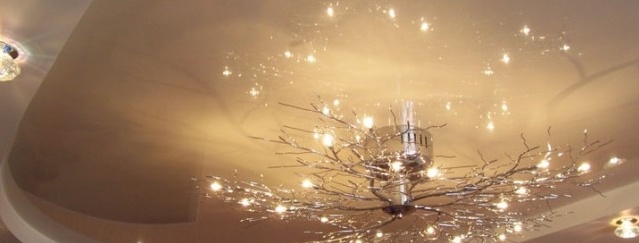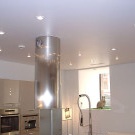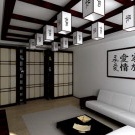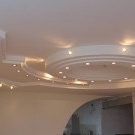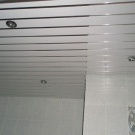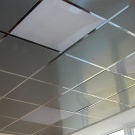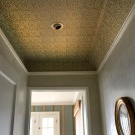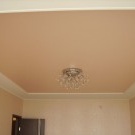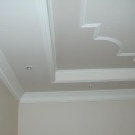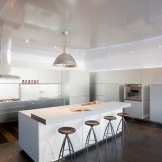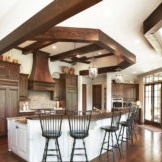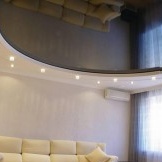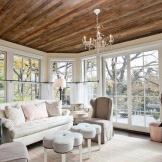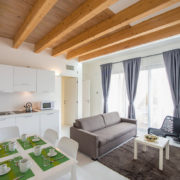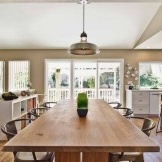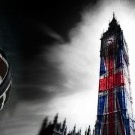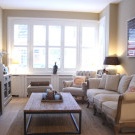Which ceiling to choose
Not so long ago, everyone either whitewashed the ceiling, or papered with wallpaper, or painted with enamel. Now, thanks to the rapid development of technology, the modern market offers all kinds of finishing materials. Therefore, choosing one or another version of the ceiling, it remains to focus only on your taste and financial capabilities.
Ceiling Stages:
1. The choice of design solutions;
2. calculation of the amount of materials;
3. calculation of the total amount of expenses (delivery, installation, etc.);
4. purchase of necessary materials;
5. the actual process of finishing the ceiling;
Stretch ceiling
This finishing option is the most prestigious and expensive, only specialists perform its installation. The most daring revelry of fantasy can reign here. For example, you can use photo printing, art painting, make a ceiling in the form of tiers or arches. The ceiling can also be multifaceted and multi-level. If fiber optic threads are used, the ceiling will be able to overflow.
Manufacturers stretch ceilings are German, French, as well as Russian firms. Foreign ceilings are better in quality, but about twice as expensive. You can read the main signs of a poor-quality canvas here. here.
Advantages of suspended ceilings:
- durability: a guarantee is given for 10 years;
- the ability to dismantle and reinstall;
- moisture resistance (manufacturers claim that the canvas can easily withstand 100 liters of water);
- low loss in height (the minimum loss in the height of the room, experts say, is 3 cm);
- fire safety (the material does not support fire);
- high strength;
- high insulating properties.
Various pendant designs
This type of decoration is now widespread, as this option allows you to create the most incredible design solutions. Most often, drywall is used for this type of finish. This is especially true for surfaces with large defects. Using this material, you can create beautiful multi-level ceilings.
Also, other finishing materials here can serve:
- plastic panels;
- mirror panels;
- textured plywood;
- lining;
- decorative wood-based panels.
The basis of the suspended ceiling is the frame. It can be made of plastic as well as metal profiles. You can use wooden slats. The frame is attached to the ceiling and to the walls with screws, glue or other fasteners.
Advantages of such coatings:
- in the inter-ceiling space, you can hide communications, ventilation, pipes, etc .;
- the ability to create a magnificent exclusive interior;
- high sound and heat insulation: this ceiling design allows additional laying of insulating materials;
- practicality and ease of care;
- does not require prior alignment of the base ceiling and other rough works;
- the ability to install original fixtures.
Wallpapering
This type of decoration is beautiful and modern. Dense wallpapers are used here.For example, you can use non-woven wallpaper. More modern optioncullet, this coating will help to hide all microcracks, perform a reinforcing function and last longer. In addition, cullet is not torn, resistant to moisture and fire and can be painted many times. It can also be applied to the ceiling and liquid wallpaper. This is done using a special gun or trowel. The ceiling for this must be dry and dust free.
Pros of wallpapering:
- sufficient cheapness;
- ease of implementation.
Whitewash
This type of decoration is traditional, but already, basically, a thing of the past. When whitewashing, the ceiling is covered with a special solution, which can be either chalky or calcareous.
Pros of this coverage:
- low cost of all materials;
- simplicity of the work itself.
How is all this done? First, an old coating, such as paint, chalk or any other, must be removed or washed off. If there are yellow spots on the surface from leaking moisture, then they must be etched with specially formulated chemical compounds. If this is not done, then yellowness will appear through any whitewash layer. After that, the ceiling is leveled, and the better the surface is prepared, the better and longer the new finishing material will hold.
First, plaster is applied, then a primer, as well as a putty. After all this, whitewashing is already done. You can decorate the white ceiling a little with the help of polyurethane stucco molding, various shades and paintings. You can also use different types of lighting, some kind of suspended structures with different stained-glass windows, and much more.
Ceiling painting
Before painting, the ceiling must be prepared as well as before whitewashing.
Advantages of such coverage:
- practicality (resistant to moisture, easy to clean);
- variety of colors;
- low cost;
- simplicity in leaving.
How is painting done? Most often, the ceiling is painted water-based paint. Painted over first tassel corners, and then a roller with a fleecy fur coat and everything else.
Aqueous emulsion is applied in several layers, moreover in different directions. In this case, it is desirable to apply the last layer perpendicular to the wall with the window.
Using water-based paint, a person may not wait for the layer to dry out, but immediately apply another. This technology is called wet.
Adhesive ceilings
This type of finish is made with square polystyrene tiles. You can read more about this material here. here.
Advantages:
- the ability to stick to almost any base;
- ease of installation;
- the ability to replace damaged tiles;
- the ability to close almost all surface flaws;
- sufficient cheapness.
Ceiling tiles come with different patterns and different colors. When using seamless tiles, the ceiling seems fairly even.Practice has shown that polystyrene tiles do no more harm than oil paint or vinyl wallpaper.
Cassette Ceilings
This design is based on special cassettes, which are thin metal plates. The drawings and colors of the outside of such ceilings are very different and look pretty nice. You can get acquainted with the cassette ceiling in more detail. here.
The advantages of such ceilings:
- ease of maintenance and cleaning;
- ease of construction;
- absolutely resistant to moisture and temperature extremes;
- due to its characteristics it is often used in laboratories and medical rooms.
Slatted ceilings
This type of ceiling is a structure consisting of metal plates (racks) with different colors and many patterns. This ceiling coating is used for small rooms. Read more about the rack ceiling here.
Their advantages:
- ease;
- the presence of many forms and colors;
- relatively simple installation;
- the ability to perform multi-tiered structures, as well as finishing arches;
- resistance to moisture and extreme temperatures.

